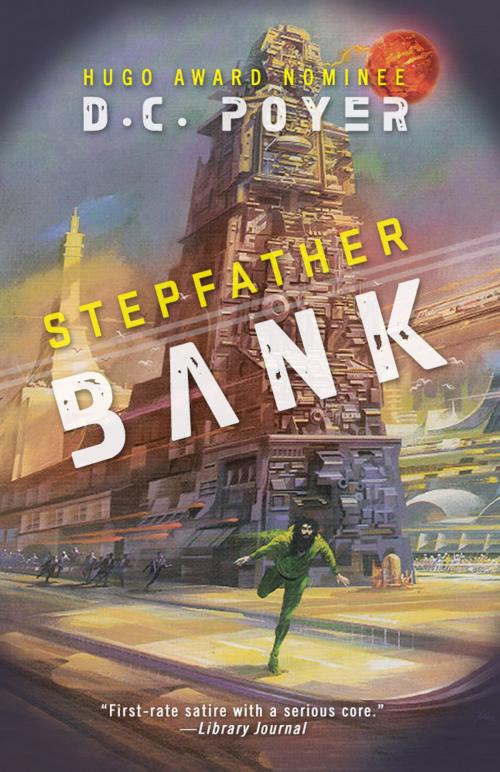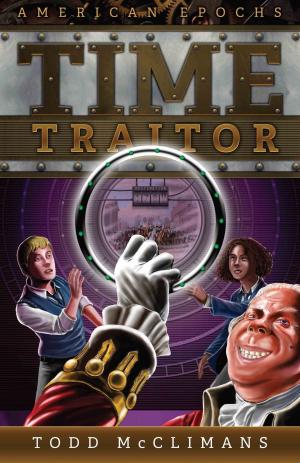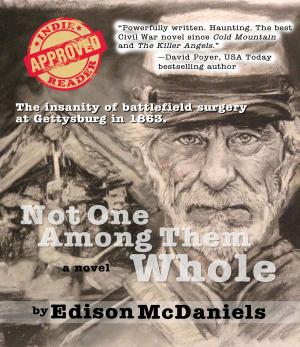| Author: | D. C. Poyer | ISBN: | 9781937997151 |
| Publisher: | Northampton House | Publication: | December 31, 2016 |
| Imprint: | Language: | English |
| Author: | D. C. Poyer |
| ISBN: | 9781937997151 |
| Publisher: | Northampton House |
| Publication: | December 31, 2016 |
| Imprint: | |
| Language: | English |
"First-rate satire with a serious core" – Library Journal
"A highly original cautionary tale . . . on more levels than the reader might first suspect." – Analog
"A jaunty, corkscrew ride through a skewed future" – Alan Dean Foster
"Burlew, his adventures and scams are funny, earthy, heroic, very human…you root for him all the way!" – Florida Times-Union
"It stands as savvy satire. It also stands as a diverting, thinking person's thriller." – The Virginian-Pilot
The year is 2110, and the Bank owns everything.
It's called simply The Bank because its full name is six hundred and sixty-six words long. It began as a secret merger of Alphabet, Disney, China National Petroleum, Deutsche Bank, Goldman Sachs, Amazon, Colombia, Fox, Egypt, and the Mafia, among many other international corporations, cartels, and governments. Occasional mentions of the Bank’s existence on the Internet were quickly deleted, or derided as the ravings of conspiracy theorists. Over its first ten years it secretly gained controlling interests in many other international corporations, cartels, and governments.
After the Last War and the intereconomicum of the Big Overheat, The Bank finally emerged into the open, to exercise what had long been predicted as the final stage of economic evolution: monopoly.
By the year 2110 it has owned Earth (et cetera) for four generations. It's eliminated armies and armaments, governments and war, cash and crime. Over the span of a hundred years it's transformed the world genetically, scientifically, culturally, and economically. It employs, is owed by, and so rules everyone. Everyone in the world.
Except Monaghan Burlew.
Burlew's styled himself as a freelance poet since the day he turned fifteen, completed minimum schooling, and became of Working Age. Since that day he's never earned a currency unit. Therefore, by law -- and the Bank is rigidly legalistic -- he pays no percentages and owes no taxes. He owns nothing, and buys nothing, so the Bank can't "assist the client in question to find the most suitable employment, considering both said client's talents and the needs of the world economic community" -- i.e., tell him where and at what to work.
He's the only man outside the System. The only one on the planet who's free.
He also has no idea that, very shortly, he will be Earth's last hope of surviving an interplanetary catastrophe.
STEPFATHER BANK is "hard" science fiction. Physics, chemistry, biochemistry, electronics, economics, systems analysis, and other disciplines are woven into the action. Yet it's paced as fast as the short stories D. C. Poyer first became known for. The works it most resembles are THE STARS MY DESTINATION, by Alfred Bester, which also dealt with a rough but sympathetic character battling the overlords of a sophisticated future; Jack London's THE IRON HEEL, in its battle of the dispossessed against their oppressor; and the skewed but always thought-provoking stories of Philip K. Dick.
STEPFATHER BANK was originally published by St. Martin's Press in hard and soft cover editions.
About the Author
D. C. Poyer's stories and novellas have been published in Analog, Isaac Asimov's, Galileo, Tesseract, Unearth, and other magazines, and anthologized in Starry Messenger, The Berkley Showcase, The Analog Annual, Jerry Pournelle's There Will Be War, and other collections and venues. His more than forty published novels include White Continent, The Shiloh Project, Star Seed, The Return of Philo T. McGiffin, The Dead of Winter, Winter in the Heart, As the Wolf Loves Winter, Thunder on the Mountain, and many other bestselling books.
"First-rate satire with a serious core" – Library Journal
"A highly original cautionary tale . . . on more levels than the reader might first suspect." – Analog
"A jaunty, corkscrew ride through a skewed future" – Alan Dean Foster
"Burlew, his adventures and scams are funny, earthy, heroic, very human…you root for him all the way!" – Florida Times-Union
"It stands as savvy satire. It also stands as a diverting, thinking person's thriller." – The Virginian-Pilot
The year is 2110, and the Bank owns everything.
It's called simply The Bank because its full name is six hundred and sixty-six words long. It began as a secret merger of Alphabet, Disney, China National Petroleum, Deutsche Bank, Goldman Sachs, Amazon, Colombia, Fox, Egypt, and the Mafia, among many other international corporations, cartels, and governments. Occasional mentions of the Bank’s existence on the Internet were quickly deleted, or derided as the ravings of conspiracy theorists. Over its first ten years it secretly gained controlling interests in many other international corporations, cartels, and governments.
After the Last War and the intereconomicum of the Big Overheat, The Bank finally emerged into the open, to exercise what had long been predicted as the final stage of economic evolution: monopoly.
By the year 2110 it has owned Earth (et cetera) for four generations. It's eliminated armies and armaments, governments and war, cash and crime. Over the span of a hundred years it's transformed the world genetically, scientifically, culturally, and economically. It employs, is owed by, and so rules everyone. Everyone in the world.
Except Monaghan Burlew.
Burlew's styled himself as a freelance poet since the day he turned fifteen, completed minimum schooling, and became of Working Age. Since that day he's never earned a currency unit. Therefore, by law -- and the Bank is rigidly legalistic -- he pays no percentages and owes no taxes. He owns nothing, and buys nothing, so the Bank can't "assist the client in question to find the most suitable employment, considering both said client's talents and the needs of the world economic community" -- i.e., tell him where and at what to work.
He's the only man outside the System. The only one on the planet who's free.
He also has no idea that, very shortly, he will be Earth's last hope of surviving an interplanetary catastrophe.
STEPFATHER BANK is "hard" science fiction. Physics, chemistry, biochemistry, electronics, economics, systems analysis, and other disciplines are woven into the action. Yet it's paced as fast as the short stories D. C. Poyer first became known for. The works it most resembles are THE STARS MY DESTINATION, by Alfred Bester, which also dealt with a rough but sympathetic character battling the overlords of a sophisticated future; Jack London's THE IRON HEEL, in its battle of the dispossessed against their oppressor; and the skewed but always thought-provoking stories of Philip K. Dick.
STEPFATHER BANK was originally published by St. Martin's Press in hard and soft cover editions.
About the Author
D. C. Poyer's stories and novellas have been published in Analog, Isaac Asimov's, Galileo, Tesseract, Unearth, and other magazines, and anthologized in Starry Messenger, The Berkley Showcase, The Analog Annual, Jerry Pournelle's There Will Be War, and other collections and venues. His more than forty published novels include White Continent, The Shiloh Project, Star Seed, The Return of Philo T. McGiffin, The Dead of Winter, Winter in the Heart, As the Wolf Loves Winter, Thunder on the Mountain, and many other bestselling books.















